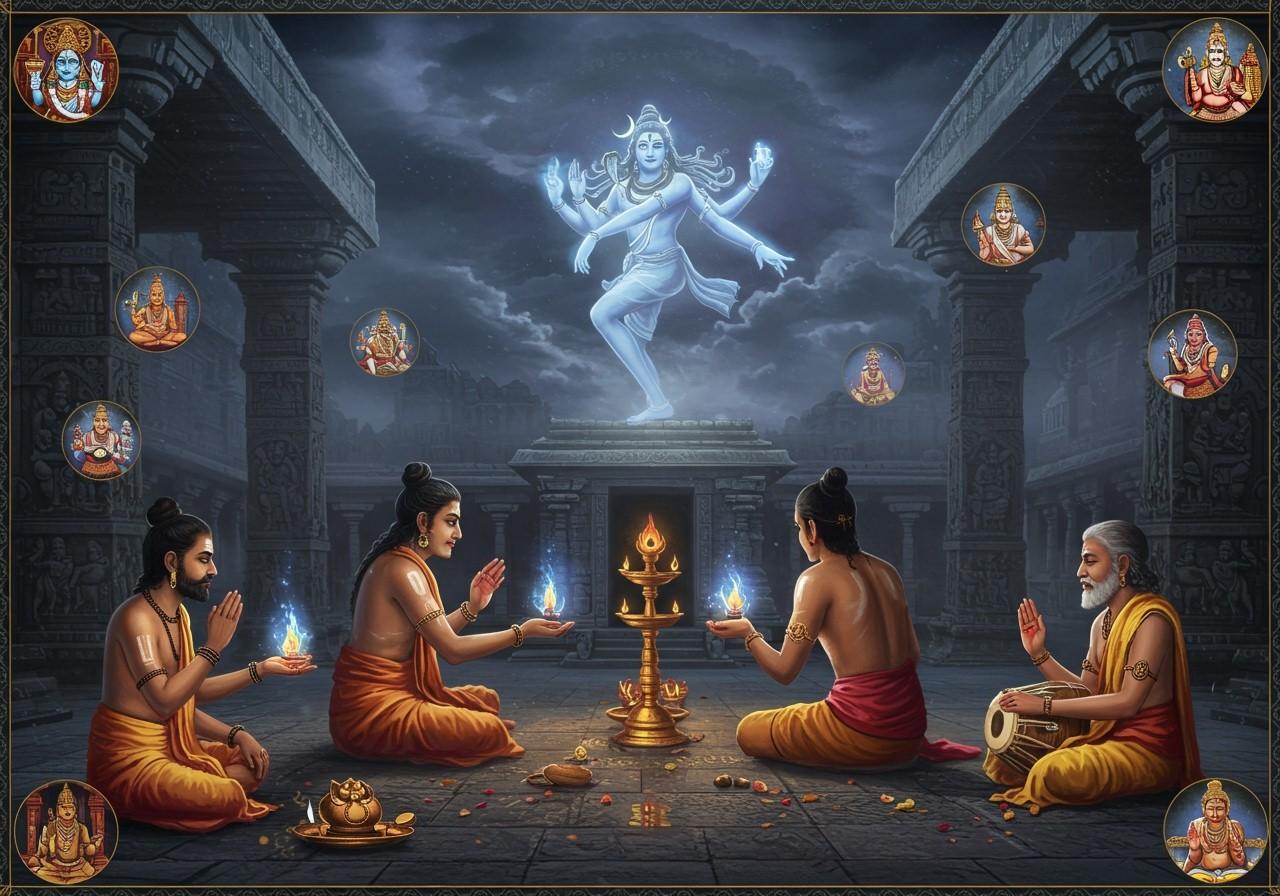
The 63 Nayanars hold a special place in the hearts of devotees of Shaivism. These saints, who lived between the 6th and 8th centuries CE, were instrumental in the Bhakti movement in South India, a period that emphasized devotion and a personal connection with the divine. Their profound influence on Hindu worship continues to inspire. This blog delves into their lives and their significant contributions to the devotion of Lord Shiva.
Who Were the 63 Nayanars?
The Nayanars, also known as Nayanmars, were a revered group of 63 Tamil saints renowned for their unwavering devotion to Lord Shiva. Hailing from various regions across Tamil Nadu, they represented a diverse spectrum of social backgrounds, showcasing a rich tapestry of cultural diversity. Their inspiring life stories are preserved within sacred texts, most notably the Periya Puranam, a cornerstone of Tamil Shaiva literature.
These saints are celebrated for their embodiment of Bhakti principles, prioritizing love and personal devotion over mere rituals. Their influence is evident in temple architecture, with numerous temples dedicated to them. The grand Arupathimoovar festival at the Kapaleeshwarar Temple in Chennai stands as a testament to their enduring significance within Tamil culture and heritage.
The Inspiring Tales of the Nayanars
The stories of the Nayanars are a treasure trove of devotion, each narrative unique and profoundly inspiring. Consider Sundarar, whose poetic compositions beautifully reveal his divine friendship with Lord Shiva. His verses resonate deeply, drawing readers into his world of profound devotion. It’s remarkable to note that Sundarar himself initially compiled a list of these saints, a compilation that became a foundational element of Tamil Shaiva literature.
Then there’s the poignant story of Kannappa Nayanar, whose devotion reached extraordinary heights. In an act of unparalleled love and faith, he offered his own eyes to Lord Shiva. This heart-wrenching tale serves as a powerful reminder of the sacrifices undertaken in the pursuit of spiritual connection. For devotees seeking to deepen their connection with Lord Shiva, consider exploring our range of Lord Shiva murtis.
The tale of Thirunavukkarasar is equally compelling. His transition from Jainism to Shaivism powerfully illustrates the transformative power of faith. His life story serves as a testament to the profound impact belief can have on one’s path, opening up new spiritual horizons. Those seeking to create a sacred space for worship might find our collection of Shiva murtis to be a valuable resource.
Karaikkal Ammaiyar stands as a remarkable figure, recognized as one of the earliest female ascetics in South India. Renouncing worldly life to embrace her spiritual calling, she became a powerful symbol of strength and unwavering devotion. Her inspiring journey continues to resonate with countless women even today.
Appar, another deeply revered Nayanar, played a pivotal role in the revival of Tamil Shaivism during periods of religious conflict. His steadfast devotion and unwavering perseverance left an indelible mark on the faith and its followers. Poojn.in offers a wide selection of Rudraksha malas and other sacred items for your personal worship.
Finally, the hymns of Manikkavacakar continue to resonate within Tamil Shaiva worship. His poetic contributions remain central to devotional practices, seamlessly bridging the past and present with their timeless beauty. Explore our collection of brass statues and other puja items to enhance your devotional practice.
The Enduring Influence of the Nayanars on Shaiva Tradition
The Nayanars profoundly shaped the Shaiva tradition in South India. Their hymns, collectively known as Tevaram, are integral to temple rituals and worship. These poetic works enriched the spiritual landscape, providing a powerful medium for expressing deep devotion to Lord Shiva.
The Nayanars also championed the Tamil language as a vehicle for spiritual expression. This significantly strengthened regional identity, connecting communities through a shared cultural heritage. Their collective efforts contributed to the establishment of Shaiva Siddhanta, a philosophical system that continues to guide Shaiva practices to this day.
Remarkably, the Nayanars challenged established social hierarchies by transcending caste and gender barriers. Their stories reflect a powerful vision of equality and inclusivity, resonating with modern themes of social justice. In Tamil Nadu, their legacy continues to thrive through festivals like Arupathimoovar at the Kapaleeshwarar Temple. These vibrant celebrations keep their memory alive, ensuring their teachings continue to inspire future generations.
Embrace the Legacy of the Nayanars
In exploring the lives and legends of the 63 Nayanars, we encounter more than simply tales of devotion; we uncover a rich tapestry of faith, courage, and profound love for Lord Shiva. Each Nayanar, with their unique and inspiring journey, offers timeless lessons that resonate across generations. They illuminate the path towards deep spiritual connections and the transformative power of unwavering belief.
The Nayanars remind us to cherish our cultural heritage while embracing the values of inclusivity and equality. Their stories serve as a constant source of inspiration, urging us to look beyond social divisions and find unity in devotion. By keeping their legacy alive through festivals and worship, we honor their invaluable contributions and ensure that their teachings remain powerfully relevant in our lives.
As we carry forward the wisdom of the Nayanars, we strengthen our own spiritual paths. Their unwavering devotion and dedication serve as guiding lights, offering beacons of hope and love in our own personal journeys. By embracing their enduring legacy, we celebrate the vibrant spirit of Shaiva tradition and its profound impact on our world. To enhance your understanding and connection with the Nayanars and Lord Shiva, explore our informative posts on Lord Narasimha temples and Narasimha Jayanti celebrations.
FAQs: Delving Deeper into the 63 Nayanars
Who were the 63 Nayanars? The 63 Nayanars were a group of Tamil Hindu saints, deeply devoted to Lord Shiva, who lived between the 6th and 8th centuries CE. They played a crucial role in the Bhakti movement in South India.
What is the significance of the 63 Nayanars in Hinduism? The Nayanars are highly revered in Shaivism for their profound devotion and their contributions to Tamil Shaiva literature and philosophy. They emphasized a personal connection with the divine, accessible to people from all walks of life. Their hymns and life stories are a source of inspiration for devotees even today. They promoted the Tamil language, strengthened regional identity, and contributed to the establishment of Shaiva Siddhanta, a philosophical system that continues to guide Shaiva practices. Their influence can be seen in temple architecture, rituals, and festivals, demonstrating their impact on religious life.
Where can I learn more about the 63 Nayanars? You can explore numerous resources to deepen your understanding of the Nayanars. The *Periya Puranam*, a 12th-century Tamil text, provides detailed accounts of their lives. Scholarly works on the Bhakti movement and Shaivism offer valuable insights into their historical and religious context. Visiting temples dedicated to them, particularly in Tamil Nadu, can provide a tangible connection to their legacy. Online resources and libraries offer a wealth of information on their hymns, stories, and significance.


